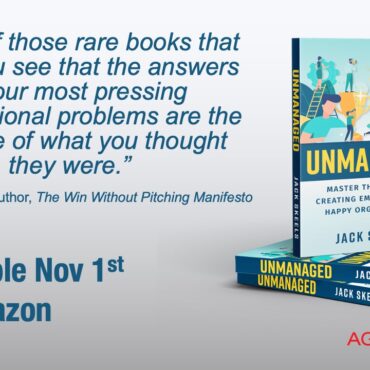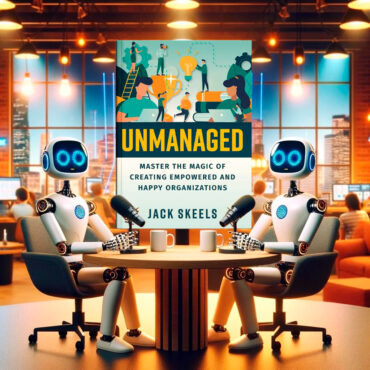
The Art of Management educates and guides managers in how to be a better manager, empower teams, increase inclusion, and be prepared for the future of knowledge work organizations.
Our model is Artisanal Management, which embodies many of the core ideas of coaching and mentorship that bring out the best in people. These concepts have been proven successful with over one hundred companies and thousands of managers and teams.
Jack Skeels, our host, is an award-winning entrepreneur, think-tank researcher, leadership coach, and consultant, and brings together decades of business research, cognitive and behavioral science, as well as practical lessons learned from agile management, into a set of simple lessons on how to understand managing, and manage, in a whole new way.
Latest Episodes
Browse All Art of Management Series
Series
The UNMANAGED Book
Released in 2024, a three-time award-winning book, UNMANAGED, was said to be" A bracing, standard-resetting approach to doing management right." by independent Kirkus Reviews. We'll feature AI-hosted summaries and even a few direct podcasts from the author, Jack Skeels.
Episodes
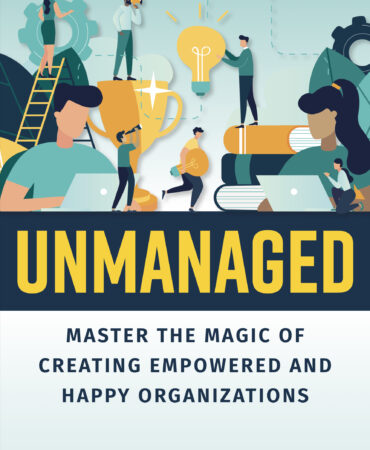
Okay, here we go! In this series you'll find our introductory episodes and several foundational topics that apply across the rest of the podcasts, including terminology and an exploration of your learning journey.
Episodes

Series
The Hidden Taxes of Managing
Managing can be the most costly thing that an organization does...and most of those costs are hard to see. The many costs of managing, and how they affect the effectiveness of the organization and its people are explored in this series. Key concepts include: the natural tax of managing, as described by Coase; the costs of managerial activity as an irritant to productive activity; and the many forms of disempowering and disabling that come from poor managerial style and lack of methods.
Episodes

Series
The Management Apocalypse
Centuries of good managerial practice was destroyed in an industrial apocalypse that began the first of many challenges in the way humans and machines work together. We'll explore the many implications of the style of managing called Scientific Management, which was ushered in during the Age of Industrialization. We'll take a decidedly-anthopological look at what good managing looked like and should strive to be in the future.

Series
The Future of Knowledge Work
AI will displace us all! Well, not really, or at least not until many of us are long gone. Yet they will continue to subsume human work activities and reshape the nature of the work that humans can do effectively and economically. In this series, we'll look at how knowledge work itself will change in nature, affecting how people and teams work, and also the shape of organizations.

The Scientific Management methods developed by Taylor have spawned decades of mistaken managing via numbers and technology. In this series, we'll explore why project management techniques often fail so utterly, including why you should hate timecards and work estimates.
Episodes

Series
Those Amazing Humans
We all underestimate each other greatly. And those beliefs color the way we work together as well as limit the effectiveness of our people, teams, mangers and organizations. In this series, we'll remind you of how this most amazing species got this far, and how completely awesomely equipped we are for our daily and workplace challenges.
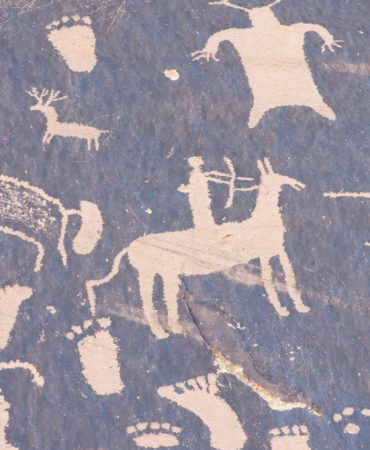
Series
The Empowered Organization
Just how much managing need managers do? In this series, we'll start to break down notions about managing and organization that were part of the Scientific Management design and replace them with some simpler ideas, including that of the FlatForce organization.
Episodes

Series
The Artisanal Manager
Despite the lingering trauma of the management apocalypse, deep inside of us lurk the old DNA that made for great managing. In this series, we'll dig into the core beliefs and principles that embody the Artisanal Manager.
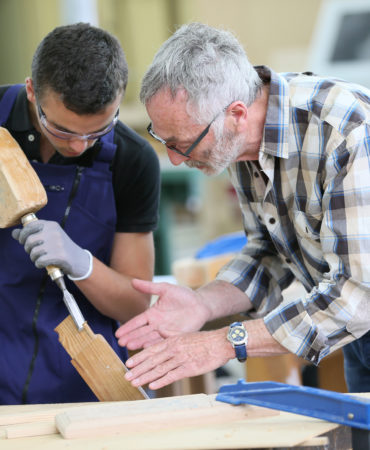
Series
Manager, Heal Thyself
Manager, heal thyself, then wilt thou also heal thy people and organization. In this series, we will explore the many pieces of "internal work" that great managers master.

Series
Making Change Happen
Change rarely sticks. Yet sometimes change can be enduring, transformative and even regenerative. In this series, we'll explore key components of organizational, team and personal transformation that support the new empowered knowledge worker organization.

Some of the awesomeness of humanity can be found in how well we work with each other. In this series, we'll explore cultures, groups, teams and a wide range of perspectives on how we are better together.

Series
Going Beyond Agile
Agile is dead. But it's lessons are still with us. In this series, we'll tear apart the myths and realities of "software agile" and the sorta-revolution that kinda happened, except for all of that ways that it didn't happen. We'll keep the good parts, as should you.

The "Meritocracy Trap" causes knowledge worker organizations to embody some of the worst managerial practices and behaviors. In this series, we'll start tearing down the hierarchy and exploring alternatives.




